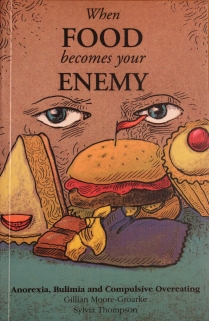Eating Disorder Awareness
Dr. Gillian Moore-Groarke, Chartered Health Psychologist
Ms. Amy-Rose Hayes, Psychology Graduate, PSI
 Eating disorders are a group of conditions that can have profound effects on individual’s physical, psychological and social well-being. They are characterised by dysfunctional relationships with food intake, which may take the form of self-starvation, such as is characteristic of anorexia, consuming extreme quantities of food, such as with binge eating disorder, and binge eating followed by purging, which is often associated with bulimia.
Eating disorders are a group of conditions that can have profound effects on individual’s physical, psychological and social well-being. They are characterised by dysfunctional relationships with food intake, which may take the form of self-starvation, such as is characteristic of anorexia, consuming extreme quantities of food, such as with binge eating disorder, and binge eating followed by purging, which is often associated with bulimia.
For Eating Disorder Awareness Week 2016, we want to critically examine the myths associated with eating disorders. These myths can be barriers to individual’s seeking help, as they may expect to be met with judgement instead of compassion. By shining a light on these all too common misconceptions, we hope not only to educate you on the underlying factors associated with dysfunctional eating, but also undermine the stigma associated with an eating disorder diagnosis.
It’s not a real illness / You are just doing this for attention
Eating disorders are not ‘fads’ or lifestyle choices. They are real, treatable psychological and medical illnesses. Other psychological co-morbidities such as depression, substance addiction and anxiety disorders are also experienced among many individuals with eating disorders. If left untreated, these disorders can have life threatening consequences, which is reflected in the high mortality rate of anorexia sufferers. Other physical consequences of anorexia include significantly lowered blood pressure and heart rate, ammenorrhoea (cessation of menstruation), overall weakness, fainting and hair loss. Bulimia can cause numerous physical problems such as irregular heartbeat, gastric rupture, chronic irritable bowel, peptic ulcers and Pancreatitis. Binge eating can also lead to elevated blood pressure, high cholesterol, heart problems and gallbladder disease.
Individuals experiencing disordered eating often go to great lengths to keep their issues with food a secret. Individuals with anorexia may attempt to hide their weight loss from their loved ones, while individuals who experience binge-eating may only engage in this behaviour alone or at night time. The purging associated with bulimia is also often covered up. If an individual makes their disorder known to you, or if you suspect a loved on of having an eating disorder, it is important that you don’t undermine the real impact that the disorder has on the individual’s life.
All you care about is how you look / food
Although eating disorders are characterised by a preoccupation with weight, food restriction, purging or binging, the mental processes behind these behaviours are much more complex, and may involve a number of interrelated psychological, biological and genetic factors that are manifested in different ways. These influences can include negative childhood experiences, family dynamic, peer or societal pressure and underlying psychological issues such as depression and low self-esteem. In the absence of more adaptive coping strategies, the eating disorder becomes a crutch to restoring feelings of safety or control, although in reality this will lead to more psychological distress. Indeed, although the disordered behaviours may cause feelings of immediate gratification, the disorder only serves to perpetuate a dangerous cycle of emotional dysregulation, resulting in feelings of shame, guilt and numbness.
But you don’t even look sick
Not all individuals experiencing disordered eating will appear to be physically ill. For example, individuals experiencing bulimia may maintain a relatively normal BMI, despite experiencing other physical and psychological issues associated with the disorder. Due to the secretive nature of eating disorders, individuals may also attempt to disguise any drastic weight changes. By the time family and friends notice the physical changes, the disordered behaviour and thinking may have been prevalent for months or even years beforehand. Indeed, many individuals experiencing eating disorders believe that they are not as ill as they are, as they themselves associate the terms with extreme weight polarities, for example total emaciation or morbid obesity. It may be more appropriate to view weight change as one of the physical symptoms of an underlying thought disorder.
But boys don’t get eating disorders
This is a very common misconception. Although eating disorders are more common among women, men account for about 10% of all cases. Indeed, the same pressures to achieve unattainable physical standards are experienced by men, and they too may experience the same biological, genetic and environmental factors that can manifest in a disorder.
What should I say?
There is no set right or wrong way to approach someone you believe may be experiencing an eating disorder, but coming from a place of compassion and genuine concern is a good starting point.
Before you approach an individual, it is important that you try to educate yourself on the thought processes behind the disordered eating. Be prepared with a helpful resource for the individual, such as the number of a Psychologist or Counsellor who could provide appropriate therapeutic support.
Try to avoid commenting on the individual’s appearance, or being confrontational. Focus more on the emotions behind the behaviour. Try to understand what purpose the behaviour serves for the individual. This could be achieved through engaging in non-judgmental active listening.
It is important to be patient. The individual may not be ready to open up. By showing your concern, you have still opened the door for the individual to approach you in the future.
Try to avoid showing anger or resentment. This can be easier said than done, as the situation can be very frustrating for family and friends. However, this will only serve to promote the cycle of the disordered behaviour.
Authors

Dr. Gillian Moore-Groarke,
Chartered Health Psychologist.
Ms. Amy-Rose Hayes,
Psychology Graduate PSI.
IrishPsychology.com,
5A Harley Court, Wilton, Cork.
Tel 021-4343073
Ms. Amy-Rose Hayes,
